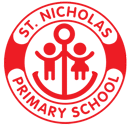Relationship, Sex and Health Education curriculum & consultation
PSHE Education (Personal, Social, Health and Economic Education) provides our children with the knowledge, understanding and skills they need to successfully manage their lives – now and in the future.
As part of a whole-school approach, our PSHE curriculum develops the qualities and attributes pupils need to thrive as individuals, family members and members of society. Our broad and balanced curriculum: promotes the spiritual, moral, social, cultural, mental and physical development of pupils at the school; prepares pupils at the school for the opportunities, responsibilities and experiences of later life and promotes British values.
At St. Nicholas, we follow JIGSAW, the mindful approach to PSHE. This is a scheme, which we have tailored to the needs of our children, to promote positive philosophy and creative teaching and learning. All activities nurse the children’s development as compassionate and well-rounded human beings. It also includes all the statutory requirements for Relationships and Health Education.
Our Curriculum
Our curriculum brings together PSHE Education, compulsory Relationships and Health Education, emotional literacy, mindfulness, social skills and spiritual development.
We follow a whole school approach, with all year groups working on the same theme (Puzzle) at the same time at their own level. There are six Puzzles (half-term units of work) and each year group is taught one lesson per week. All lessons are delivered in an age- and stage-appropriate way so that they meet children’s needs. The six puzzles are: Being me in my world, celebrating differences, dreams and goals, healthy me, relationships and changing me.
Being Me In My World covers a wide range of topics, including a sense of belonging, welcoming others and being part of a school community, a wider community, and a global community; it also looks at children’s rights and responsibilities, working and socialising with others, and pupil voice.
Celebrating Difference focuses on similarities and differences and teaches about diversity, such as disability, racism, power, friendships, and conflict; children learn to accept everyone’s right to ‘difference’, and most year groups explore the concept of ‘normality’. Anti-bullying, including cyber and homophobic bullying, is an important aspect of this Puzzle.
Dreams and Goals aims to help children think about their hopes and dreams, their goals for success, what their personal strengths are, and how to overcome challenges, using team-work skills and tasks. There is also a focus on enterprise and fundraising. Children learn about experiencing and managing feelings of pride, ambition, disappointment, success; and they get to share their aspirations, the dreams and goals of others in different cultures/countries, and their dreams for their community and the world. It is great for children to have this experience, to think ambitiously, and to have aspirations.
Healthy Me covers two main areas of health: Emotional/mental health (relaxation, being safe, friendships, mental health skills, body image, relationships with food, managing stress) and Physical health (eating a balanced diet, physical activity, rest and relaxation, keeping clean, drugs and alcohol, being safe, first aid). Most of the statutory content for Health Education (DfE) is contained within this Puzzle.
Relationships starts with building a respectful relationship with self and covers topics including families, friendships, pets and animals, and love and loss. A vital part of this Puzzle is about safeguarding and keeping children safe; this links to online safety and social networking. Children learn how to deal with conflict, build assertiveness skills, and identify their own strengths and strategies for building self-esteem and resilience. They explore roles and responsibilities in families and friendship groups, and consider stereotypes.
Changing Me deals with change of many types, from growing from young to old, becoming a teenager, assertiveness, puberty, self-respect and safeguarding. Each year group thinks about looking ahead, moving year groups or the transition to secondary school and how to cope positively with such changes. Life cycles and human reproduction are taught in some year groups at the school’s discretion. Jigsaw has produced a separate leaflet explaining the approach taken with Relationships and Sex Education. Your child’s school can make this available to you on request.
How can I support my child with PSHE?
Sometimes PSHE education conversations with your child will arise incidentally, when you playing or cooking together, when you are watching television or films, or through news stories. In such cases we cannot always control the stimulus for the question or conversation, only how we manage it. Other times, you may wish to initiate a conversation about a topic you feel is important to approach.
It can be helpful to start talking about a PSHE topic using a stimulus — such as a storybook, film, news article, scenario or case study. It is important that any stimulus is chosen very carefully.
Here are some useful resources:
Mentally Healthy Schools – There is a filter option for parents and carers. They have resources for a range of topics.
The Book of Hopes: Words and Pictures to Comfort, Inspire and Entertain Children
BBC Bitesize – Activities to promote a growth mindset
Words for Life – Lots of age related activities to do at home, with cross-curricular links!
Nuffield Health – Well-being activities to keep healthy and active at home!
Spread Happiness – A YouTube channel dedicated to spreading happiness and positivity
Cosmic Kids Yoga – Yoga, mindfulness and relaxation for children
Anna Freud – Resources for self-care
Grow Your Mindset Stories – Stories to promote a growth mindset
Young Minds – Resources to support and promote mental health and well-being
Place2Be – A mental health charity
